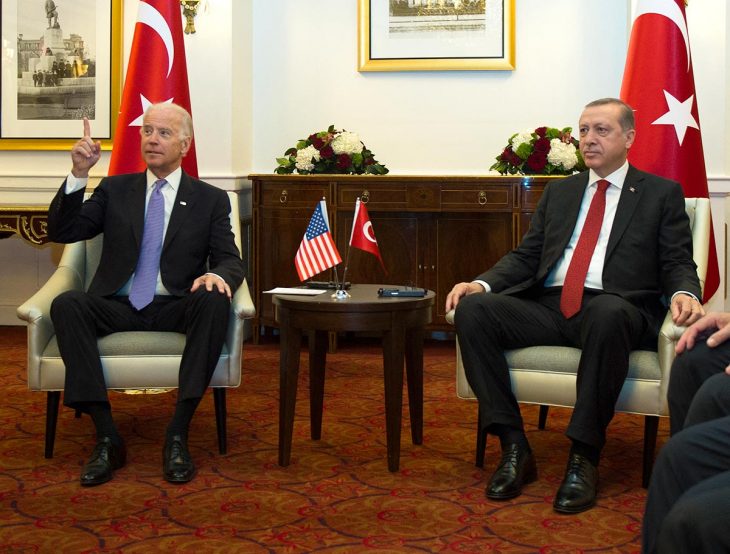In a statement marking the 106th anniversary of the massacre's start, Biden wrote, "Each year on this day, we remember the lives of all those who died in the Ottoman-era Armenian genocide and recommit ourselves to preventing such an atrocity from ever again occurring." One hundred days after taking office as President of the United States, Democrat Biden was keen to mark a break with his predecessors who, every year, carefully avoided using the "G word" (G for genocide) in order not to offend Turkey. This was the case of Donald Trump, who was kindly disposed throughout his term of office towards Turkish President Recep Tayyip Erdogan. But it was also the case under Barack Obama, whose vice-president Biden was from 2009 to 2016, and who never took the step for fear of harming the alliance with Turkey within NATO.
The Armenian community in the US, numbering over one million people mostly descended from survivors of the 1915 genocide, welcomed this recognition with relief. Their country joins 30 or so others that have already recognised the genocide, under pressure from Armenian organizations. "Joe Biden is refusing Turkey's gag rule," said the Armenian National Committee of America (ANCA), one of the main associations representing the diaspora. For decades, its demands have been met with powerful Turkish lobbying in Washington. Ankara, which denies the genocidal nature of the massacres committed by the Young Turk government in 1915, has spent millions of dollars on communication campaigns to propagate its own version of events. For the centennial in 2015, the White House referred only to "the atrocities of 1915". However, several countries had defined them as a genocide, starting with Germany. Germany, an ally of the Ottoman Empire during the First World War, even acknowledged its complicity, making it more difficult to contest.
Turbulence in Washington-Ankara relations
If Biden finally used the term genocide in 2021, it is primarily because the political context is favourable. The US Congress already took a position in this direction in late 2019. The House of Representatives and the Senate then successively adopted, unanimously, a resolution calling to "commemorate the Armenian genocide" and to "reject attempts to associate the US government with the denial of the Armenian genocide". Such a text had previously been blocked several times in the Senate by Trump's Republican allies, including in November of that year, just after a visit by Erdogan.
This semantic break with the past confirms that relations between the United States and Turkey are going through a period of great turbulence. Since 2016, their strategic military alliance has been undermined with Ankara's purchase of Russian S400 missiles and its exclusion from the US F-35 aircraft development programme. Distrust has set in. The Turkish government suspected Washington of having supported the July 2016 coup attempt orchestrated, according to Ankara, by the preacher Fethullah Gülen, exiled in Pennsylvania, and it got closer to Vladimir Putin.
As soon as it took office, the new American administration showed firmness. Its first strong gesture was the appointment as Middle East advisor of Brett McGurk, former special envoy for the anti-jihadist coalition in Syria, persona non grata in Turkey, which considers him a supporter of Kurdish "terrorists”. On April 19, three Democratic senators also reintroduced legislation aimed at condemning attacks on fundamental freedoms in Turkey. "The free pass issued by the Trump presidency to Erdogan to commit violations has officially expired," declared Senator Edward Markey.
"The logical result of a mistaken policy”
Turkey’s routine diplomatic protests, like every time a country or institution takes a stand on this 1915 issue, seemed more timid this time. The Turkish ambassador in Washington was not recalled. And the Turkish president has remained more measured than usual in his reactions. He knows that his room for manoeuvre is limited. As the years go by, Turkey's state denial becomes less and less audible. This was pointed out by Namık Tan, former Turkish ambassador to Washington: "The recognition today by the United States of the events of 1915 as genocide is the logical result of a long-standing wrong policy of Turkey, which has contributed to its isolation in the world," commented this former career diplomat, who is recognized as one of the brightest of his generation.
The US administration has also noted a radicalization of Ankara on the Armenian question as on many others. After a period of openness, from 2005 to 2013, during which speech began to be freer in Turkey and the Armenian genocide to be debated in the Turkish media and universities, this chapter has closed. A few days before Biden's statement, Erdogan's communications director, Fahrettin Altun, organized a conference at the presidential palace, bringing together the most rampant denialists to defend theses that have been widely discredited. Since he allied himself with the far-right ultranationalist party after 2015, President Erdogan has reverted to hostile positions towards the Armenians and their demands for justice. The recent war in Nagorno-Karabakh has added fuel to the fire. Azerbaijan, supported by Turkey, embarked last fall on a re-conquest of this South Caucasus province, a region it has disputed with Armenia since its independence in 1991. This victorious campaign was followed by a triumphal parade in Baku, in the presence of Erdogan, who indulged in vibrant praise of the Young Turks. It is impossible not to link these events to the genocide of 1915 and the impunity that has followed it for over a hundred years.
Historians’ considerable advances
This has not stopped the "wall of denial" from gradually crumbling in Turkey. Garo Paylan, a member of parliament of Armenian origin and an elected member of the pro-Kurdish HDP party, believes that what will count in the end "is the recognition by the Turkish parliament”. And he hopes that it will happen. "The day Turkey faces the Armenian genocide, it doesn't matter what other parliaments say. The Armenian genocide has been the focus of other countries, other presidents, because it has been denied for 106 years." If Ankara has been able to sow doubt, thanks to the intervention of eminent historians such as Bernard Lewis, a British professor emeritus at Princeton University and close to American neo-conservative circles, it is becoming difficult today to deny facts that are more and more substantiated. Research on the planned extermination of Armenians at the end of the Ottoman Empire has made considerable progress in the last 20 years. And, in the vast majority of cases, the researchers who have taken up this question are Turkish, like the historian Ümit Kurt, author of a history of the Armenians of Aintab (Gaziantep). Another Turkish historian, Taner Akçam, one of the pioneers of "genocide studies" and a professor at Clark University near Boston, has also pushed back against denial. In 2019, he published "Killing Orders", a book that analyses coded telegrams sent by Talaat Pasha, the architect of the 1915 genocide, and establishes the premeditation and planning of the massacres.
Biden's stance only makes Ankara's denial a little more difficult to sustain.






